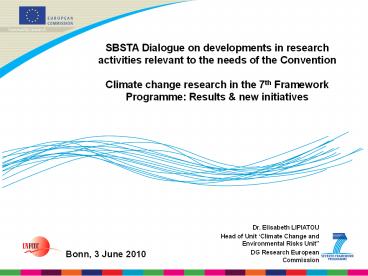Dr. Elisabeth LIPIATOU - PowerPoint PPT Presentation
Title:
Dr. Elisabeth LIPIATOU
Description:
SBSTA Dialogue on developments in research activities relevant to the needs of the Convention Climate change research in the 7th Framework Programme: Results & new ... – PowerPoint PPT presentation
Number of Views:153
Avg rating:3.0/5.0
Title: Dr. Elisabeth LIPIATOU
1
SBSTA Dialogue on developments in research
activities relevant to the needs of the
Convention Climate change research in the 7th
Framework Programme Results new initiatives
Dr. Elisabeth LIPIATOU Head of Unit Climate
Change and Environmental Risks Unit DG
Research European Commission
Bonn, 3 June 2010
2
FP7 A regional research programme with global
scope
- International cooperation in FP7
- FP7 is a programme open to the world with in
total 39 States contributing - FP7 is open to participation of all countries of
the world - FP7 provides support for climate research in and
by developping countries
3
FP relative contribution to Non Annex 1 Countries
4
- FP7
- Recent results
5
Temperature changes for different scenarios and
transport modes
Climate research-Key results Transport
6
(No Transcript)
7
Climate research-Key results Full cost of
climate change
ClimateCost provides major research into economic
policy tools Development of PAGE-model a model
used in the Stern Review Global annual total of
impacts given the IPCC A1B scenario Impacts
include sea level rise, economic, non-economic
and discontinuity 50 chance of approaching 20
trillion /year in 2200 5 trillion /year in
2100 5 chance of approaching 50 trillion /year
in 2200! By comparison, Global GDP was 70.21
trillion in 2009!
5 Probability line
Mean
25 Probability line
5 Probability line
8
Climate research-Key results ARCTIC
DAMOCLES
September 2008 and 2009 had the second and third
lowest summer ice extents ever observed.
- Projection show that sea-ice in summer might
completely disappear by the end of this century. - Unless emissions are curbed significantly, a
stabilisation of the Arctic's climate system will
be unlikely
9
Climate research-Key results
Ocean acidification
- Model results indicate that under summer
conditions 10 of Arctic - surface waters will become under saturated within
10 years and - most of the surface Arctic by mid-century.
- In the Canary Current system, simulations
indicate both strong seasonal upwelling of under
saturated waters and a trend that will render
half the waters above 250 m to become under
saturated by year 2050.
10
- FP7
- New initiatives
11
Key issues highlighted in the Accord-importance
of research
- Projections of impacts of a global temperature
change up to 2C for Europe and in vulnerable
regions, - Need for robust monitoring, reporting and
verification methodologies related to the
implementation of policy commitments - The design of mechanisms for reducing emissions
from deforestation and land use - Robust quantification of emission reduction
potential and associated costs in key sectors. - Adaptation actions to minimise the adverse
impacts of climate change
12
Climate research- New initiatives (2010-11)
- Global targets feasibility and affordability
(2o C and below) - Impacts of a global temperature increase up to
2C from pre-industrial level, in Europe and most
vulnerable regions of the world - Mitigation measures in the world's major
economies compatible with global temperature
increase up to 2C
13
Climate research- New initiatives (2010)
- Improve climate projections-future climate, an
issue of scale - Modelling improving climate projections require
sustained upstream efforts on the development of
models. New projects. - Downscaling climate projections need to address
finer geographical scales. Funding is provided to
these activities essential notably to the
development of climate services.
14
Climate research - New initiatives (2010)
- Climate services
- Global Monitoring for Environment and Security
(GMES) addresses challenges and next steps for
the space component including services. - Joint GEO-IPCC Expert Consultation How GEOSS
could serve the data needs of the climate
communities and support the IPCC assessment
(Geneva, date to be confirmed).
15
Climate research- New initiatives (2009)
Climate Change impacts on Water and Security in
Southern Europe and neighboring regions
Multi-disciplinary approach Environment and
Social Sciences
- Integrated monitoring and modelling system to
reduce uncertainties in climate change impact
analysis (CLIMB) - Quantification of risks including socio-economic
factors. (WASSERMed) - Climate change, hydrological impact on national
security and armed conflicts. Vulnerability and
adaptation (CLICO)
16
Climate research- New initiatives
(2010) Agriculture, Food Security and Climate
ChangeJoint Programming Initiative
17
Climate research- New initiatives (2009-2010)
- Arctic
- Assessing and quantifying climate change impacts
on key sectors (maritime transport, fisheries,
tourism and resource extraction) and on how these
sectors could affect the Arctic environment - EU and Russia cooperation for enhancing GMES
earth observation coverage. - Research infrastructures for polar research
Interdisciplinary observation and monitoring
stations for atmospheric, terrestrial and marine
studies
18
Climate research- New initiatives (2009-2010)
- Carbon cycle research
- Impacts of climate variability and weather
extremes on terrestrial carbon sinks. Response of
soil carbon to increasing temperature.
(CARBOEXTREME) - Annual to decadal variability of carbon and GHG
budgets of terrestrial ecosystems. CO2, CH4, and
N2O.(GHG Europe) - Vulnerability of the ocean carbon sources and
sinks under future climate conditions.
(CARBOCHANGE)
19
Context of communication post-Copenhagen
- General public
- Goal To sustain and enhance the credibility of
scientific information to go beyond the social
awareness, facilitating active behavioural
engagement - Message to emphasize the regional and local
dimension of information of the impacts and
implications at individual level Present
information in a way that affirms rather than
threatens peoples values. - Policy makers
- Goal To increase awareness and use of research
results relevant to the policy making process - Communication to focus on scientific evidence and
propose policy options explain research methods
used will increase credibility new mechanisms to
improve translation of results.
20
Thank you for your attention
- Contact elisabeth.lipiatou_at_ec.europa.eu































